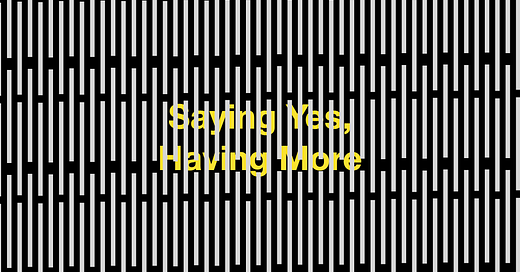One can’t go through a conversation nowadays without having the word, ‘Multi-’ attached in it. I took up Multimedia Arts in College a decade ago and even up to this day, I still can’t come up with a proper, simpler, perhaps more succinct description for what it actually means. It’s a fallacy, really.
That ‘many’ would always be synonymous with the ideals of ‘better’, ‘progress’, ‘success’, ‘the right way to go’. Take American big box stores, for example. I don’t frequent a lot of them for this very reason: I have very little need for ‘more’ of what they are selling. Although they all have varying degrees of business models, store experiences, target audience range and branding, they all seem to preach the same message to the loyal masses: bigger and more stuff for absolutely lower prices, guaranteed. BIGGER. MORE. LOWER PRICES. I have no doubt in my mind that, in terms of modern day business strategy, this is actually genius work. It is effective for what it sought out to do. It just works for almost everybody.
But at what cost? Do we really need more stuff? Is there a correlation between how big our garages and TVs are with the growth of own personal happiness? Why does it matter that it’s on sale if the one we have right now is perfectly working? At what point will we stop and say, ‘maybe we don’t need to part with our money right now to feel accomplished’? Am I getting high off the ubiquitous ‘add-to-cart’ buttons especially with the stress of the world right now?
It’s not so bad, right? It’s all harmless… stuff, right?
Unfortunately, there’s a hidden cost to having ‘more’ of what we can actually handle. In Product and in UX, this is usually resolved with the practice of Feature Prioritization. You basically group features and rank them based on a few different metrics: value, technical difficulty, strength of user need and demand etc. It prevents teams from clogging up softwares with untested stuff simply because every single one of them costs money and energy. So, therefore, one has to bet wisely and make smarter decisions with where to focus on with the highest chance of impact possible. No decent product manager in the world would disagree to this. At least, I would hope so.
More is not always better. Focus is completely underrated in a world where everyone is trying to have everything, even at the expense of these hidden costs:
Quality: Are we doing more things but with less than the capacity and attention it deserves?
Environment: Is—whatever this is—sustainable? If not, is it worth the harm it’ll produce naturally? Or will it be just a forgotten thing a few seasons from now?
Morality: Who is making that sacrifice so we can all enjoy a low-cost _insert X consumer product_?
Time: By saying Yes to this, what am I saying No to? I have limited time to really live, is this the best use for it at the moment?
Personal: Will this—whatever it is—make me feel more and more human (compassionate, empathetic, generous, conscientious etc)? or will this do the exact opposite? And how is this good for the world (country, society, home) right now?
If all of this is true, and there really are hidden costs to saying yes and having more, then what is stopping us from changing this culture? Is this the kind of world we want our kids to wake up to and get excited about? Whatever happened to the good old fashioned selective and deliberate ownership of time, money, energy and resources.
There is a price to pay for saying yes and having more. It’s just not as fashionable nor profitable nor, in some cultures, acceptable to say out loud. I have faith that we can change that by design.
To be extra focus and intentional for every single bucket we pour our time, money and energy on is the daily goal.
Who knows, if we do that often enough, maybe we can wake up in a world where the most exciting thing to talk about is less Black Friday sales and more of the things that truly matter. Whatever that means for you, and whatever that means for the world.
As with most cultural revolutions, it starts and ends with Design. Pay more attention with how the world is being designed on your behalf. You have more influence and power than you think. All of us do. There is no such thing as a role too small in this big of change.
May we all make better choices this year.
This post will be continued…
Thank you for listening and reading,
Nikki
Materials that are helping me think about this more clearly
"When it comes to networks, the bigger the better, right? Not necessarily. Carefully curate your most trusted, inner circle and you’ll be surprised at how much more valuable you’ll become to the larger community of people in the world who care about the same things you do."
From Why Your Inner Circle Should Stay Small, and How to Shrink It
Know someone who might like or benefit from the contents of Working Title? Want to share this publication but don’t know which article to pick? #37: Best of Working Title, 2021 is the best place to start.
Or… was this email forwarded to you? :)









Share this post